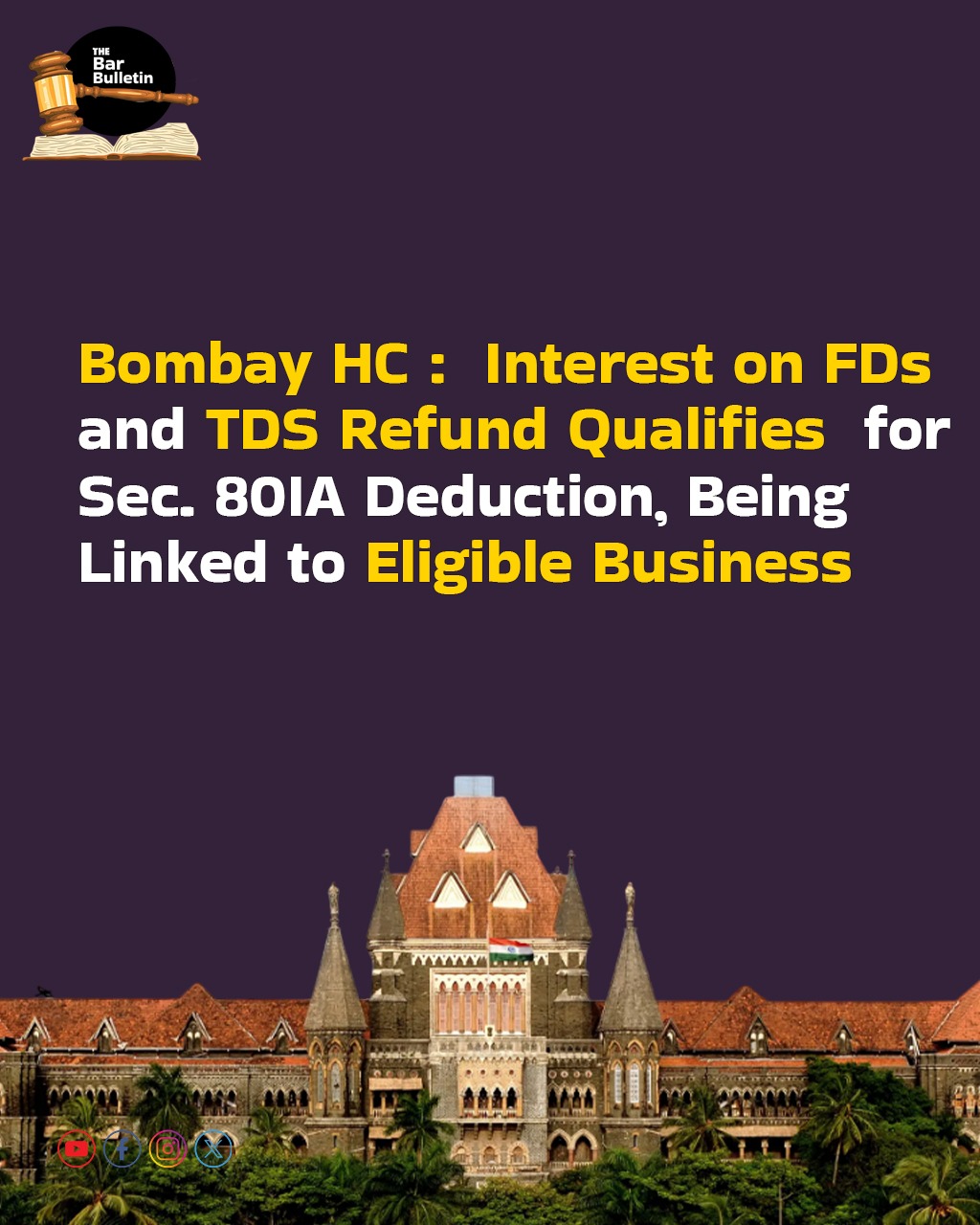The Bombay High Court recently ruled that the appellant is entitled to the deduction under Section 80IA of the Income Tax Act on the interest earned from fixed deposits which were placed by the Appellant for planning of replacement of equipment as per the provisions of the License Agreement and due to the tariff dispute. The ruling came after finding that a) the placement of fixed deposits was imperative for the purpose of carrying on the eligible business, b) the Appellant had used these fixed deposits for purchasing cranes for the eligible business, and c) there is a direct nexus between the fixed deposits and the eligible business of the Appellant.
With respect to interest on TDS refund, the Division Bench comprising Justice B.P. Colabawalla and Justice Firdosh P. Pooniwalla noted that the TDS was wrongly deducted by the vendors/customers of the Appellant from the payment made to the Appellant for using the port facility, and, therefore, the TDS wrongly deducted was directly a part of the sales receipt of the Appellant from the eligible business. The Bench added that the TDS refund arose to the Appellant due to the excess TDS cut by the customers against payment to be made to the Appellant, and therefore, the TDS was a part of the business receipt of the Appellant. Had the customers not deducted the excess amount of TDS, the Appellant would have received the surplus funds, which would be used for business purposes/ repayment of loans, etc.
Accordingly, the Bench concluded that the Appellant is entitled to a deduction under Section 80IA on the interest received by it on TDS refunded to it, as the TDS refund received by the Appellant is an integral part connected with the receipt of business income by the Appellant and the same cannot be separated from the business of the Appellant. The Bench therefore allowed the appeal in favour of the Appellant-taxpayer and directed the Revenue Department to grant a deduction under Section 80IA to the Appellant on business income in the nature of interest from fixed deposits with the bank, as well as on interest on TDS refund.
The Bench referred to the decision of the Apex Court in the case of CIT Vs. Karnataka State Co-operative Bank [(2001) 251 ITR 194 (SC)], where it was held that, “if placement of funds is imperative for the purposes of carrying on the business, the interest income derived therefrom would be income from the assessee’s business and entitled to deduction under Section 80P(2)”. Reference was also made to the decision of the Apex Court in the case of CIT Vs. Shree Rama Multi Tech Ltd [(2018) 403 ITR 426 (SC)], where it was held that “if there is any surplus money which is lying idle, and it has been deposited in the bank for the purpose of earning interest, then it is liable to be taxed as income from other sources but if the income accrued is merely incidental and not the primary purpose of doing the act in question which resulted into accrual of some additional income, then the income is not liable to be taxed and is eligible to be claimed as a deduction”.
In this case, the Appellant, a government undertaking engaged in the operation and maintenance of a container terminal at Jawaharlal Nehru Port Trust (JNPT), had earned interest income out of the said eligible business, and explained that the interest earned out of money accrued from the eligible business was also utilized for its eligible business. It was further claimed that interest was earned from fixed deposits maintained with banks for business purposes, and interest was also earned on the refund of taxes due to the wrongful deduction of TDS by the customers of the Appellant. After the Appellant filed its return claiming a deduction under Section 80IA on the interest income, the AO, though, accepted the claim for deduction on the interest earned on fixed deposits as being a part of the business income. He, however, taxed the interest income arising from the income tax refund under the head “Income from other Sources”.
When the matter came before the CIT(A), he issued an “Enhancement Notice” under Section 251(2), proposing to disallow deduction under Section 80IA for various amounts, inter alia, including interest earned on fixed deposits, which was accepted as being part of business income and allowed as a deduction by the AO. The CIT(A) was of the view that the interest income derived from the bank against parking of surplus funds cannot be considered to be derived from the activity of the industrial undertaking merely by reason of the fact that the activity may result in earning the said income in an indirect, incidental, or remote manner. This finding of the CIT(A) was confirmed by the ITAT.
Cases Relied On:
CIT Vs. Karnataka State Co-operative Bank [(2001) 251 ITR 194 (SC)]
CIT Vs. Shree Rama Multi Tech Ltd [(2018) 403 ITR 426 (SC)]
Arul Mariammal Textiles Ltd. v/s. Assistant CIT (2018) 97 Taxmann.com 298 (Madhya Pradesh)
CIT v/s. Indo Swiss Jewels Ltd. (2006) 284 ITR 389 (Bom)
Cases Distinguished:
Liberty India Vs. CIT [2009] (183) Taxmann.com 349(SC)
CIT Vs. Sterling Foods [1999] 104 Taxmann.com 204 (SC)
Shah Originals Vs. CIT [2023] 156 Taxmann. com 695 (SC)
CIT Vs. Swani Spices Mills Pvt. Ltd. (2011) 12 Taxmann.com 432 (BOM)
Appearances:
Senior Advocate P. F. Kaka, along with Advocates Manish Kanth and Atul K. Jasani, for the Appellant/Petitioner
Advocate Akhileshwar Sharma, for the Respondents

